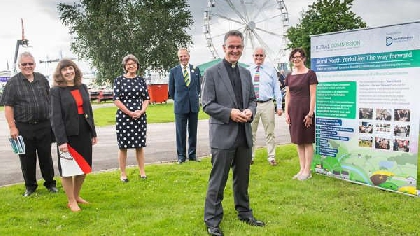
North Yorkshire’s Rural Commission, the first of its kind nationally, has called on local and national Government and key agencies to take forward recommendations in a hard-hitting report, launched today to bring about levelling up for rural communities. The Commissioners, who are experts in rural affairs, have drawn up a series of radical actions to transform the region into one that has more young people, has a thriving rural economy and is fully connected.
Their report “Rural North Yorkshire: the way forward” was launched at the Great Yorkshire Show to an audience of key stakeholders, including representatives from the Department for Culture, Media and Sport as well as the Environment Agency, housing associations, charities, community agencies, landowners, business and the National Farmers Union among others.
The Lord Lieutenant of North Yorkshire, Jo Ropner, also attended and commended the report.
The Commission is strongly of the view that devolution is a priority to achieving effective levelling up for rural and remote North Yorkshire.
The Commission believes that central government must ensure additional powers and funding for the devolved authority so that it has real capacity within the region for decision-making and control of significant funding.
Commissioners told stakeholders today that a key recommendation would be for the devolved authority to establish a Task Force that would include civil servants, rural business, banking and industry, academic and scientific expertise, and local communities to advise and help implement the recommendations of the report.
The Rural Commission was established as an independent body in autumn 2019 by North Yorkshire County Council to re-examine the evidence base and draw conclusions and recommendations which would help these most rural communities address the challenges and grow and prosper.
A key challenge for rural North Yorkshire is the missing generation of young people who do not live and work in the region. The Commission has estimated that if North Yorkshire had the same percentage of younger adults per head of population as nationally, there would be over 45,500 additional younger working age adults living in the county than there are today and North Yorkshire would be £1.5 billion better off annually.
The Very Reverend John Dobson DL, Dean of Ripon and also chair of the Commission said: “At the heart of this report is the fundamental belief that people are the greatest asset in North Yorkshire. They build community, economy and a good life. The missing generation of younger workers in the county hinders the ability of North Yorkshire to achieve the full potential of an effective economy.
“This missing generation relates to all of the themes examined by the Commission; unaffordability of housing for this age group, school closures because of lack of demand, the people to drive a forward looking green economy, depleting services because of declining population, and a skewed older age group. North Yorkshire needs a strong devolved authority to tackle the problems faced by its rural and remote areas.”
County Councillor Carl Les, North Yorkshire’s Leader said: “We set up the Rural Commission as an independent body so they could look with fresh eyes at the many problems that have troubled our rural communities for years. We thank them for their hard work, their months of sifting evidence, visiting communities and discussions with key figures and agencies in rural affairs and joining up the thinking into one report.
“The Commissioners’ recommendations are rightly challenging, for us at the County Council as for other agencies and Government departments. Nevertheless it is pleasing to see that the Commission does recognise work that the County Council has done, and that the pursuit of devolution is the right thing to do.”
The Commission examined a broad range of subjects on seven key themes - farming and land management; schools, education and skills; transport; jobs and the economy; digital connectivity; housing and energy transition.
Throughout their report Commissioners have raised difficult and hard policy questions to be addressed:
- Affordable rural housing must become a reality rather than an aspiration and this will require more houses in rural and remote areas rather than on the edges of market towns. The Commission believes it is possible to achieve this objective without compromising the region’s beauty.
- Tackling climate change is a priority for the county. The Commission firmly supports the region’s ambition to become a ‘green lung’ and to lead on employment in the green economy and a revolutionary energy transition.
- Farming needs radical change to be sustainable for the future.
- Digital connection underpins many of these ambitions. The Commission believes that digital connection must be understood as a human right.
- The region has considerable wealth and the Commission sees a mutual bank as a means for intra-county investing in levelling up sparse areas. Often smaller initiatives seeking seed funding have less success with mainstream banks.
It is the Commission’s belief that this type of future rural North Yorkshire will flourish, attract rural North Yorkshire’s missing generation who will bring vibrancy, energy, and vision to the region. It will mean that current policy problems such as school closures will be reduced significantly.
The Commission strongly advocates for the levelling up debate not only to focus on Northern industrial regions, but also on remote and rural regions and the significant potential of rural and sparsely populated rural areas to contribute to the national economy, achieve net zero targets, and drive energy transitions.
Through its deliberations, the Commission concludes that the national policy of rural proofing is ineffective, it is unable to identify the specific issues and priorities of different rural areas.
Dean John said: “It is our belief and hope that our recommendations will lead to a connected region, that has a thriving community in which people of all ages and background can find a home and play a part in community life bringing vibrancy, energy, and vision to the region
“What do we hope for in a decade? It is our hope that digital connection will have been executed as a human right. We hope that more sensitively designed houses will have been built in rural and remote areas. We expect rural North Yorkshire to be a green lung, to have led on imaginative energy transition, and have a diverse green labour force.
“We want young people to have better education options. We aspire to the region having sustainable agriculture that works with nature. We want remote and rural areas to be connected by appropriate models of transport.
“We now look to local and national Government and many partners and stakeholders to take ownership of these recommendations and make this vision a reality. The future of rural communities is at stake.”
Read the full Rural Commission report here.
Vision for rural North Yorkshire: Beautiful, connected, and embracing the future: Executive Summary
This is the first Rural Commission of its kind. Our report aims to preserve the beauty of Rural North Yorkshire while embracing new ways of living and being.
The issues the Commission has examined require positive behavioural change to allow rural and remote North Yorkshire to become a leader in the green economy, have beautiful living rural spaces, to be digitally connected, farm sustainably and have vibrant services. The Commissioners believe that a thriving rural community is one in which people of all ages and backgrounds can find a home and play a part in community life.
The Commission strongly advocates for the levelling up debate not only to focus on Northern industrial regions, but also on remote and rural regions. The debate must recognise the significant potential of rural and sparsely populated rural areas to contribute to the national economy, achieve net zero targets, and drive energy transitions.
The Commission is strongly of the view that devolution is a priority for rural North Yorkshire. The Commission believes that central government must ensure additional powers and funding for the devolved authority so that it has real capacity within the region for decision-making and control of significant funding.
The Commission examined seven key themes: rural economy; energy transition; digital connectivity; farming and land management; rural schools, education and training; rural housing; rural transport. Cross cutting themes were also examined.
Key recommendations:
Rural economy: key challenge: North Yorkshire has a diverse economy. There is high skilled employment but there is also a significant low wage economy.
What Commissioners suggest:
- Devolution is critical to ensuring the right use of investment in the region and the Commission calls on the government to agree a deal as a matter of urgency.
- The County Council must encourage investment in the region. This could be pursued through a mutual bank, with supporting funding from the Levelling Up Funds or the Shared Prosperity Fund.
- The Commission sees a role for North Yorkshire leading in green employment including food, farming, forestry, and renewable energy. The Levelling Up Funds or the Shared Prosperity Fund must provide seed funding support to be match funded by industry.
Energy Transition: key challenge: Up to 47% of North Yorkshire is designated as either a National Park or Area of Outstanding Natural Beauty. Much of the rural housing stock is made of solid brick or stone walls; there is no gas grid, and weak electrical infrastructure
What Commissioners suggest:
- The Government must invest in an electricity structure that does not overlook rural and remote areas.
- The York and North Yorkshire Local Enterprise Partnership and the County Council must advocate for investment in rural electricity infrastructure.
- The National Parks and Areas of Outstanding Natural Beauty should execute an enabling strategy to permit the essential infrastructure and upgrades to buildings to be undertaken, to ensure a ‘fit-for-purpose’ future within these protected landscapes.
Digital connectivity: key challenge: The Commission acknowledges the commitment and considerable investment the County Council has made to digital connectivity in North Yorkshire. Despite the significant investment, digital connectivity remains a significant challenge, especially in rural areas.
The Commission is strongly of the view that digital connection must be considered a human right.
What Commissioners suggest:
- The Yorkshire National Parks and Areas of Outstanding Natural Beauty must establish a Digital Inclusion Group to advise on a digital infrastructure that will be acceptable for these protected regions.
- National government and communications regulator Ofcom must understand digital connectivity as a human right. This is as much a human right for people in rural and remote areas as it is in urban areas. The Commission advocates that the government begin by connecting its most remote citizens to avoid the typical lagging-behind model.
- The Department for Digital, Culture, Media & Sport must place a higher priority on digital inclusion in rural communities and set out a strategic approach to address the issue for North Yorkshire and other sparsely populated areas. The Shared Prosperity Fund could be used as a vehicle to address this issue.
Farming and Land Management; key challenge: North Yorkshire has a long and proud history of farming. There was a great deal of evidence that farming, and farmers are facing significant challenges and policies must be developed to assist them to meet these challenges.
What Commissioners suggest:
- The Department for Environment, Food and Rural Affairs must have a more integrated approach to farming, land management and the environment. It must recognise that farming and land management practices are central to achieving environmental targets. Working with nature, rather than substituting for it, will deliver the most profitable farms in conjunction with the most sustainable nature.
- The County Council, in conjunction with the Yorkshire Agricultural Society, should facilitate a new Farm Business Task Force to direct the culture change needed for the farming future and to ensure changed business practice meets environmental targets. This should liaise closely with the national Agricultural Productivity Task Force.
- The Department for Environment, Food and Rural Affairs must provide free business coaching and mentoring support to help farm businesses survive and restructure, whilst ensuring support is in place to help farmers exit the industry with dignity.
Rural schools, education and training; key challenge: North Yorkshire has the highest number of small schools in England. Rural schools perform well. Yet, rural schools risk closure. The sustainability of rural schools is largely attributable to falling pupil rolls, financial difficulties and schools standards. Children attending small rural schools achieve better educational outcomes than urban children, yet they are less likely to go on to further and higher education when they leave school.
What Commissioners suggest:
- The Commission believes that the Department for Education must revise its National Funding Formula to ensure increased support for rural super sparse secondary schools.
- The County Council must lead on pioneering a two-stream educational system post GCSE in rural and remote areas, with one stream focusing on vocational education while the other remains academic.
- The County Council and the York and North Yorkshire Local Enterprise Partnership must strengthen the offer for post-16 education and provide a better sense of future for young people.
Rural housing; key challenge: In North Yorkshire, there is a significant shortage of affordable homes in large parts of the County and an acute housing shortage within the national parks. The general high cost of rural housing means that the region is unaffordable for low- and medium-income families.
What Commissioners suggest:
- The formula for designating affordable housing must be revised by the Ministry of Housing, Communities & Local Government so that it does not reflect market value in an area but rather average income in the area.
- The County Council should be enabled to have the power to levy a charge on second homes which must stay in the county and be used to further affordable housing.
- Each parish in rural North Yorkshire should build five houses over a ten-year period. 40% of this housing stock must be affordable or available for rental.
Rural transport; key challenge: People who live in super sparse and rural areas need to travel for school, employment, shopping, and health facilities. This raises issues that include accessibility, affordability, and environmental impact.
What Commissioners suggest:
- The Commission believes that the Department for Environment, Food and Rural Affairs must make it clear what rural fund will replace the loss of the EU Rural Development Programme funding which allowed local communities to respond imaginatively to local needs around transport.
- Until the devolved authority is established, the County Council must have the power to use Shared Prosperity Funds and Levelling Up funds to design relevant schemes for rural and remote areas in North Yorkshire.
- The Commission believes that the County Council should take up the opportunity to provide more innovative passenger transport such as demand responsive transport across the county
Cross cutting themes; key challenge: The Commission identified a number of issues for the region that are impacted by all of the previous themes. These are the demographic challenge and the missing generations; leadership; the importance of community and climate change.
What Commissioners suggest:
- Devolution is critical to securing long-term investment into the region and the Commission calls on the government to agree a deal as a matter of urgency. This will allow North Yorkshire to ensure best use of levelling up funds for its remote and rural regions.
- The County Council must establish an Advisory Task Force to include civil servants, rural business, banking and industry, academic and scientific expertise, and communities to take forward our recommendations.
- The Commission urges the government to ensure Levelling Up funds recognise the needs of sparsely populated northern regions as much as the needs of northern industrial regions.
- Community and social infrastructure are critical. The government must ensure Levelling Up funds protect social infrastructure in remote and rural regions.


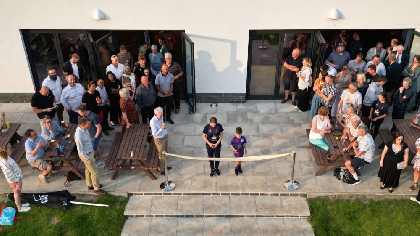 Skipton celebrates opening of community Sports Hub
Skipton celebrates opening of community Sports Hub
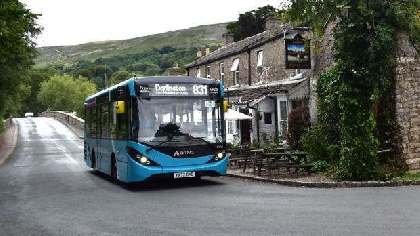 Bus service in the Dales COULD be improved
Bus service in the Dales COULD be improved
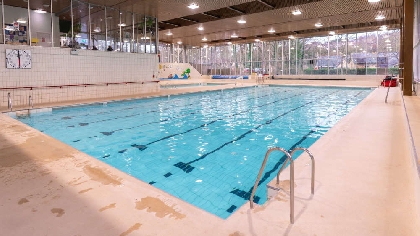 Future of Richmond Swimming Pool thrown into doubt by discovery of extensive work needed
Future of Richmond Swimming Pool thrown into doubt by discovery of extensive work needed
 New three-metre-high landmark for historic market town
New three-metre-high landmark for historic market town
 Grant fund open to applications
Grant fund open to applications
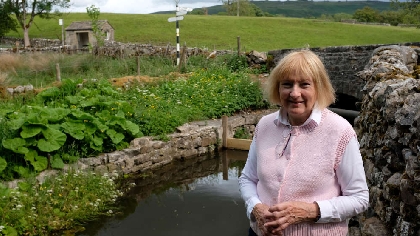 Wash dub restored in Craven village
Wash dub restored in Craven village
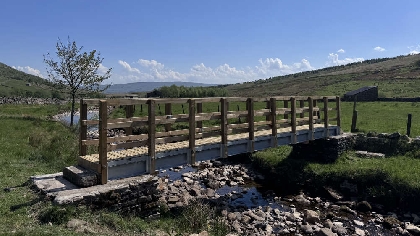 Footbridge replaced, as path maintenance figures set out
Footbridge replaced, as path maintenance figures set out
 Business Awards returns
Business Awards returns
Comments
Add a comment